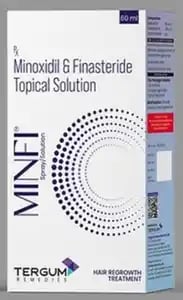Densita MF Topical Solution 60 ml
Densita MF Topical Solution 60 ml is a dynamic duo designed to combat common male pattern baldness and renowned for its role in promoting hair growth, joins forces with the drug.
Which addresses the root cause of hair loss by regulating hormonal factors together, they offer a comprehensive approach for individuals seeking to retain and regrow their hair, making this combination a go-to solution for those dealing with hair loss.
This medication is formulated for external use only and is specifically tailored for addressing common male pattern baldness.
It contributes to hair growth by relaxing blood vessels and improving blood flow to the hair follicles.
Simultaneously, that inhibits the body's production of a male hormone in the scalp linked to hair loss, addressing the root cause of the issue.
Together, they complement each other to provide a comprehensive solution for hair loss.
Follow your doctor's instructions regarding dose and duration adhering to these instructions promotes the proper and effective use of the medication.
Possible side effects include severe scalp irritation, unwanted growth of facial hair, chest pain, fast heartbeats, swelling in your hands or feet, and rapid weight gain.
Monitoring for these effects is crucial, and any unusual symptoms should be reported promptly to your healthcare provider.
Regularly monitor blood pressure throughout treatment and report chest pain, rapid heartbeat, or swelling promptly.
Exercise caution if you have a history of heart disease adhere strictly to the prescribed dosage, avoiding excessive application and contact with eyes or broken skin.
If you forgot a dose, take it as soon as you remember however, if the next dose is approaching, skip the missed one and follow the regular dosing schedule.
Avoid doubling the dose, and adhering to the prescribed regimen for optimal effectiveness and safety.

Similar Medicines
More medicines by EG Lifecare Services Pvt Ltd
Disclaimer : This information is not a substitute for medical advice. Consult your healthcare provider before making any changes to your treatment . Do not ignore or delay professional medical advice based on anything you have seen or read on Medwiki.
Densita MF Topical Solution 60 ml
Prescription Required
Packaging :
bottle of 60 ml Lotion
Manufacturer :
EG Lifecare Services Pvt LtdComposition :
Minoxidil (5% w/w) + Finasteride (0.1% w/w)










.svg)
